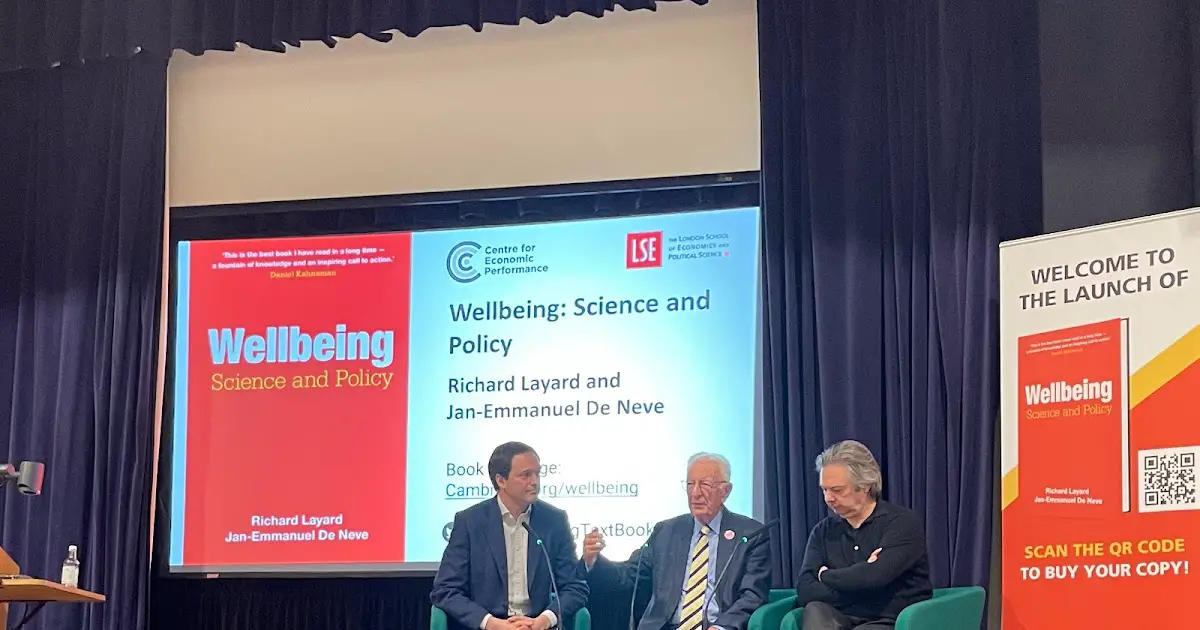I’m not an expert at being happy. But I have thought about it a lot. I was fortunate to grow up around many wealthy and successful people. However, like many, members of my extended family, and friends, have suffered from a range of mental illnesses, ranging from addiction, alcoholism, and eating disorders to bipolar, anxiety, depression and OCD.
One of my uncles, a Managing director of a cosmetics company, suffered from depression and committed suicide in his mid-forties, leaving a wife and two twin children, aged three. One of my closest and oldest friends, an award-winning journalist and newscaster (ABC News, BBC, Sky) died due to complications from depression and substance abuse two years ago.
Therefore I learnt earlier than most that there was a better route to happiness than purely wealth and success. Hence my interest, both at an academic & personal level, in this subject. The event was centred around Professor Lord Layard, of the LSE and Jan-Emmanuel de neve of Oxford University’s new book ‘Wellbeing: Science & Policy’.
Professor Layard began with Thomas Jefferson’s quote that ‘The care of human life and happiness is the only legitimate object of good government‘ – Professor Layard also said that the UK’s opposition (Labour) leader has committed to making wellbeing, not GDP alone, one of his key drivers of policy.
How do Professors De Neve and Layard measure happiness? It’s rather simple yet brilliant. The survey-takers just ask this:
It’s a powerful question – it is more predictive of your longevity than running a battery of medical tests with your doctor (the famous ‘medical’). I urge you to ask that about your own life, your work, your relationships and your home.
Professor Layard said he could think of no more important question for the government. I can think of no more important question to ask yourself.
Professor De
Neve has researched tracking companies’ share price performance that rated
happiest versus a range of other key indices. As you can see from the chart
above, happier companies outperformed all other indices and were exceptionally
resilient during downturns. This holds obvious implications for CEOs, CFO’s and
heads of Human resources.
And what
causes happiness? Is it income? Education? Physical health? No, actually, the most significant correlation is with Mental health, as you can see by this chart.
At the end of the talk, we had the opportunity to ask questions. So I asked ‘bearing in mind that Sir Keir Starmer has said that he would pursue policies of wellbeing in his next government; assuming that his government wins the next election, and that you have a ‘one shot’ chance to implement the most impactful ‘wellbeing policy’ you can think of, what would it be?’
Unsurprisingly the speakers said that they would tackle mental health, which they have already been working on – helping over 700,000 people so far with their initiatives. However, they said they would focus specifically on addiction (substance abuse, alongside other addictions like eating disorders and gambling).
Later that evening, having dinner with a friend of mine, Damien Seaman, we talked about that response. Damien told me he was surprised since he thought this would affect a small number of people in society. Yet around 8 per cent of the population are addicts. Even a highly educated Oxford graduate had no idea the extent of this mental health crisis and the misery it’s causing.
Source link














Leave a Reply